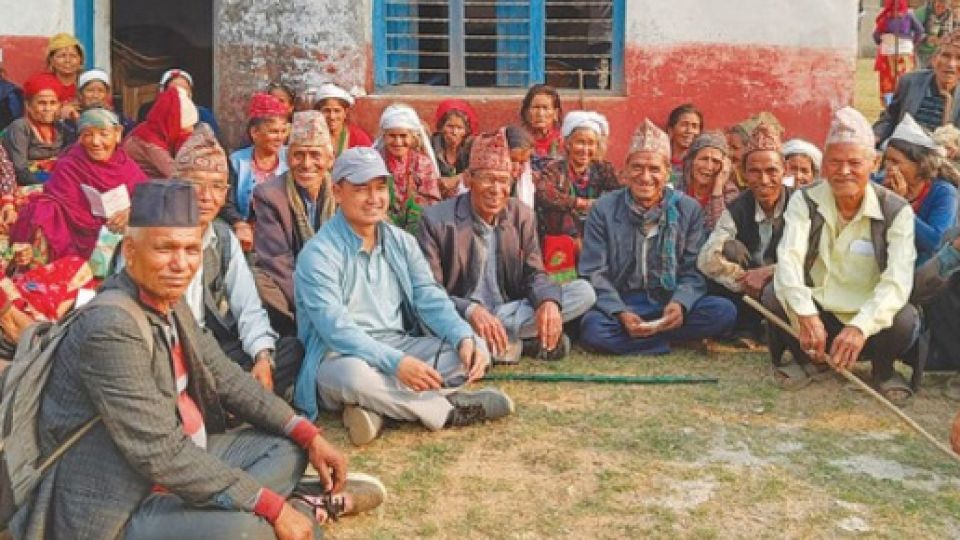May 28, 2024
KATHMANDU – It takes nearly three days for Amrita Nepali, a 70-year-old woman from remote Rahaph in ward 1 of Turmakhand Rural Municipality, to reach the administrative centre of the rural municipality to collect her elderly allowance.
Due to the challenging terrain of the hilly region, people are forced to walk for days for any kind of administrative or bank-related work. Nepali complained that elderly people are the hardest hit when visiting the administrative centre of the rural municipality. “The only bank in the rural municipality is at the administrative centre, so people have no option but to make the arduous journey,” she added.
The government has made it mandatory to distribute social security allowances through the banking system apparently to check irregularities, but elderly people in the remote settlements have been affected due to the government’s decision.
In view of the hardship of senior citizens and people with physical disabilities, some local units in Achham including Turmakhand are attempting to distribute the allowance from the ward office. But it has not been quite effective due to lack of human resources and internet penetration.
Banks have reached the administrative centres of all ten local units of Achham, but citizens of remote areas are still several days away from them. While urban areas are becoming more developed by the day, the remote areas are being left out.
“I use my elderly allowance for daily consumables and medicines, and save some, but now I don’t think I will ever go to the bank to get the money because I don’t think I can walk for three days,” said Nepali.
After the formation of the local units following the 2017 local elections, the government decided to ensure that each local unit has at least one bank branch and that social security allowances are directly sent to the beneficiaries’ bank accounts.
This decision to send the money directly to beneficiaries was made so receivers such as the elderly and disabled will not have to suffer and so the government will be able to monitor every transaction without errors while simultaneously controlling irregularities.
Before the government took such a decision, ward secretaries and other officials of ward offices of local units would distribute social security allowances in cash.
“I wish people like me who are dependent upon the allowances provided by the government should get the allowance easily at our doorsteps so that I wouldn’t have to suffer by travelling for days,” said Nepali.
Amrita Nepali and all the elderly citizens of the country get a monthly allowance for senior citizens of Rs 4,000 per month as a social security grant.
The condition of Dhakari Rural Municipality is also similar to that of Turmakhand. Due to difficult terrain and lack of internet connection at the administrative centre and ward offices, they have not been able to transfer the social security grants directly to beneficiaries.
The topography of wards 1, 3, 5, 6, and 7 of the municipality is challenging. As a result, several beneficiaries, especially the elderly and disabled, have stopped visiting the administrative centre to collect their social security allowances. “So we started distributing the allowances from the ward office with the help of bank employees and police personnel,” said Bikram Bohara, the information officer at the rural municipality. “There are at least 15 senior citizens in each ward who are unable even to visit the ward office to receive the allowance. We visit their homes and hand over the cash.”
According to Bohara, the distribution of cash to the beneficiaries has not been regular and it has several challenges. “The bank and the police office have limited manpower. And it is quite risky to carry a huge amount of cash without proper security arrangement,” said Bohara.
Sanphebagar Municipality in collaboration with the local bank, had once distributed the social security allowances at the beneficiaries’ doorsteps. But the municipality could not continue the service.
“We attempted to distribute the allowances through the banking system by visiting the ward offices. But the plan had to be cancelled due to poor internet access. Now, people have to come to Sanphebagar to collect their allowances,” said Rajendra Kunwar, mayor of Sanphebagar Municipality.
“In case of the disabled person, someone with a consent letter from the beneficiary and recommendation from the ward office can collect the allowance on their behalf. However, the beneficiaries often complain to us as it is difficult and costly to visit the administrative centre to collect the allowance,” Kunwar added.
According to him, mainly the people from Khaptad, Patalkot, Budhakot, Devisthan have difficulties receiving the social security allowance.
Dhan Bahadur Thapa, chief administrative officer of Chaurpati Rural Municipality, said that the beneficiaries of 12 villages and settlements located in all seven wards of the rural municipality have to walk for up to three days, risking their lives through narrow foot trails, to visit the administrative centre for the allowances.
“We visit the ward office every three months and distribute the allowances to the beneficiaries who cannot visit the administrative centre. We rely on the local unit officials, bank officials, and security personnel to carry out cash distribution. All expenses, including food, lodging, and travel of the team, are covered by the rural municipality,” said Thapa.


